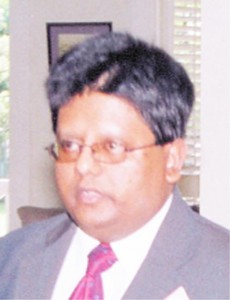The Government says that from January 2009 the temporary $4,000 relief paid to public servants earning below $50,000 per month as of May 2008 will be incorporated into their basic salaries and another 5% has been approved for those earning over $50,000 effective May 1, 2008.

These two measures were quietly announced last week even though Public Service Minister Dr Jennifer Westford had said as recently as December 19 that there would be no further payout for public servants before the end of the year. On a walkabout on December 24, President Bharrat Jagdeo announced that the cost of living adjustment for those earning below $50,000 would be incorporated into their basic salary and Finance Minister Dr Ashni Singh elaborated on this in a December 27th statement and also revealed the further 5% for those public servants earning above $50,000 per month
Dr Singh said the various increases during the year had the effect of increasing the gross pay of the various categories of public servants by percentages ranging between 18 and 24, the Government Information Agency (GINA) reported.

In a press release, GINA said that this is despite the fact that up to December, the prices of a number of goods and services have come down dramatically since the measure was introduced in May 2008.
Dr Singh pointed out that the cost of living adjustment was introduced at a time when there was upward pressure on fuel and food prices as a result of global factors and when there was no immediate prospect of relief from the adverse external conditions.
Minister Singh pointed out that gasoline, diesel and kerosene prices have declined domestically by some 43, 32 and 48 percent respectively from the levels they were at in June shortly after the cost of living adjustment was introduced. The Minister also cited a number of other goods and services whose prices have receded since the middle of this year, including public transportation, cooking gas, wheat, rice, and flour, GINA said.
The release stated that the Minister pointed out that the decision to retain and incorporate the cost of living adjustment into basic pay was taken as a result of Govern-ment’s concern to ensure progressive improvements in the disposable incomes of its employees, particularly those at the more junior salary scales, and has to be seen alongside other interventions made by Government during 2008 such as the increase in the income tax threshold from $28,000 to $35,000 monthly from the start of this year.
The statement recalled that in May this year, Government had granted approval for a temporary cost of living adjustment of $4,000 to be paid monthly, tax-free to public servants, teachers, and members of the disciplined services earning a basic salary below $50,000 per month based on their April 2008 salary after taking into account the 5 percent across-the-board increase that had also been announced at the time. “Government had also indicated that the $4,000 monthly adjustment was intended to be temporary in nature and would be reviewed at the end of 2008.”
Incorporate
Minister Singh explained that, in incorporating the cost of living adjustment into the basic salary, Government would gross-up the $4,000 amount that was being received to include PAYE and National Insurance Scheme (NIS) deductions where applicable, so that when the revised basic salary is subject to PAYE and NIS deductions, the individual’s net pay would be preserved, GINA said.
The release further stated that Minister Singh also highlighted that Government’s decision to incorporate the temporary cost of living allowance into the basic salaries of eligible beneficiaries, along with the 5 percent salary increase granted to such persons this year, has the combined effect of increasing the gross pay of such individuals by percentages ranging between 18 and 24 percent.
“To illustrate the point, Minister Singh gave the example of a Government employee at the minimum wage of $28,415 in December 2007. In the case of such an individual, after the 5 percent increase is added and the temporary cost of living allowance is grossed-up for the employee’s NIS contribution and added on top of this, the revised gross pay becomes $34,055, an increase of 19.8 percent from the December 2007 level. The Minister further pointed out that the percentage increase in such an individual’s net pay would be even higher, when one takes into account the effect of the increase in the income tax threshold”, the release asserted.
It added that it is a similar case with all public servants, teachers, and members of the disciplined services who received the temporary cost of living adjustment, “with the effective increase in gross pay rising to as much as 24.1 percent when one takes into account the 5 percent increase, and the grossed-up cost of living adjustment now incorporated into basic salary.”
The release said that the Finance Minister further indicated that, in the case of public servants, teachers and members of the disciplined services who were not in receipt of the temporary cost of living adjustment because their salary was above $50,000 a month and who had therefore only received the 5 percent increase, Government had granted approval earlier this week for their 5 percent salary increase to be adjusted upwards to 10 percent with effect from 1st May 2008.
Unprecedented
The Finance Minister pointed out that 2008 had been a year of unprecedented macroeconomic and financial challenges, pointing to the historic rise in commodity prices in the first half of the year, to which government has responded. This was followed in the second half of the year by the global financial crisis, the onset of recession in the major economies of the world, and a rapid receding of commodity prices, GINA said.
GINA added that these developments brought different and new challenges to the domestic economy, particularly in the case of the productive sectors which export primary commodities and which faced significant reductions in the export prices they receive. In addition, the sugar sector returned a production performance that the Minister described as extremely disappointing. Against this background, Minister Singh emphasized that it is most commendable that Government was able to preserve macroeconomic stability, including price and exchange rate stability, maintain overall expansion in the real economy, contain the fiscal deficit to levels anticipated at the mid-year, and still implement interventions such as those in relation to public service wages, the release declared.
On December 15, Guyana Public Service Union President Patrick Yarde had written Dr Singh urging an interim payout at the end of the year for public servants while the union continued to negotiate with the government.
In the letter, Yarde urged the minister to intervene in the matter, stating that he is “the architect of the allocation of public funds”.
The GPSU president said that an estimated eighty percent of public servants are living below the poverty line, stating that the payment of increases in salary has been well below the rate of inflation and has resulted in a decline in the purchasing power of the public workers as can be noted from the table below.
According to him, parliament’s approval of levels of remuneration considered sufficient for the public worker to enjoy a reasonable existence and livelihood is a gross misrepresentation of reality, and that it has resulted in Guyana’s public workers being driven further into abject poverty.
Yarde said that his union completely rejected the government’s position on the payout, and in referring to a statement by Dr. Roger Luncheon about payments being negotiated with the unions and that the life of an agreement they had with GPSU had ended, the GPSU President said the union had no such agreement with government since 2000.
“The GPSU considers this state of affairs to be unsatisfactory, unconscionable, uncaring and unfair to public workers. In this regard, the GPSU demands that you address the short payment to public workers below the inflation rate, and rectify it as an interim measure..”, Yarde stated.
But even after this letter, Dr Westford had told a GPSU forum on December 18 that Government was not in a position to offer public servants the year-end payout they have been used to receiving, although it understood how important that money is to families.
She said cash in hand is important, particularly during this season when families are getting together, but stressed the need to economise.
Addressing members of the GPSU at its General Council meeting, Westford said public servants needed to spend wisely at this time, and they can look to next year when government intends to address their concerns holistically.
Westford said the union and government had been negotiating for sometime now, as they had in the past hoping to find a solution, but the discussions will have to continue in the new year.




